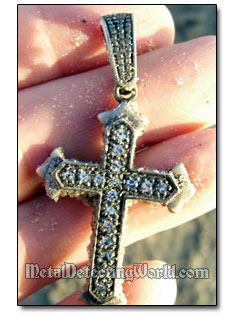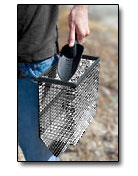Types of Metal Detecting Activities, page 18:
DRY SAND BEACH HUNTING
(CONTINUED from previous page)
Metal Detectors Required for Beach Hunting on Dry Sand

On iron mineral-free beaches such as beaches in Florida, most of the later VLF metal detectors with manual Ground Balance and Discrimination controls work well. With a Discrimination control set near bottle cap rejection, the signals emitted by salt minerals in the dry sand are eliminated. If the detector's audio cannot be "smoothed out" by setting the Discrimination near bottle cap rejection, iron magnetite is probably the reason, and a different metal detector may be required.
On beaches with heavy iron mineralization (black sand), the VLF detector's performance may be either limited or totally failing unless the detector has Automatic Ground Balance and Tracking options.
Also the Sensitivity level can be lowered to eliminate false signals, especially when detecting near a transition zone where dry and wet sand combine. You will lose some depth, but at least you will still be able to operate. To keep Sensitivity at the optimal level, try to walk towards the surf line with sensitivity set to maximum. If the detector begins to "chirp," lower the sensitivity setting until the sounds disappear. Then turn and walk parallel to the surf line while adjusting sensitivity so that the detector remains quiet.
On beaches where black sand (iron magnetite) is present, the choice of metal detectors is narrowed considerably. All detectors of old types such as BFO and TR are out of the question because they cannot cancel the effects of natural iron.
Most of the latest manual and automated VLF detectors are good for detecting on dry sand beaches. Detectors of the BBS and FBS technologies are better choices as these machines ignore black sand and salt minerals and allow a detectorist to adjust Discrimination properly.
Pulse Induction detectors ignore any mineralization and detect deeper than any type of metal detectors, but they can not discriminate the unwanted targets; thus, turning the dry beach hunting into a hard physical exercise. Plus, if the hip-mount configuration or headphone housing for controls (available on models of the DetectorPro's Headhunter line) are not used, PI detectors are heavier than other types because of extra battery requirements and the heavier watertight design of the control box (on submersible models). This will be a major cause for the arm fatigue's fast development. That is why PI detectors are used mostly for wading and underwater treasure hunting.
If your detector is not protected by its manufacturer against the environment, it is necessary to cover its control box not only with a rain-cover, but also with a plastic bag. Some hobby enthusiasts utilize plastic watertight casing (housing) especially designed for using land metal detectors in beach environments.
Both plastic bag and watertight casing will protect the detector's control box from mist, rain and blowing sand which can easily work its way into the electronics. The environmentally protected or water-resistant detectors designed for beach detecting in rain or splashing surf are the optimal choices.
Equipment and Accessories Used in Beach Hunting on Dry Sand

• Light-weight Plastic Sand Scoop can be used for fast and easy target recovery. However, a durable steel short-handle scoop would be a better choice. And the long handled scoop would be the best choice if you do not like to kneel down or bend down a lot.
It is very useful to have a magnet in the back of the scoop. It helps you catch little pieces of iron and steel that keep going through the sand scoop.
• Side Beach Basket/Sifter is very useful for dry beach hunting. It is designed to be worn on either side of your hip to dump dry sand into the basket and has an aluminum backing with a sand reflector to toss the sand away from your body. A heavy 1/2" mesh screen is used for durability. As you shake the basket a few times, the dry sand is quickly sifted through the mesh screen while everything else stays in the basket. Such baskets/sifters are also great for competition beach hunts.
• Headphones are required to hear the faint and tiny signals and to minimize the sounds of winds, splashing waves and people.
• Extra Bag will be helpful in dealing with lots of trash that you will end up with while metal detecting at the crowded beach during weekends or national holidays.
• Sturdy Light Gloves will protect your hands from accidental cutting by broken glass or sharp fragments of aluminum beer cans or sea shells. At least, one glove is recommended for the hand that comes in contact with sand.
• Pick-Type Digger with a long handle is used for uncovering targets without having to kneel down. This tool is useful for those who use metal detectors with excellent pinpointing.
• 3-Compartment Pouch is used to keep your "keeper" beach finds - silver and gold jewelry and coins, separately. The pouch should be waterproof to prevent soiling your clothes and sturdy enough to hold plenty of weight.
• Headlamp is good to have when your daylight beach hunting activity is likely to continue into the night hours.
• Kneepads are recommended.
• Regular Treasure Hunting Shovel is used for recovering targets from the sandy soil mixed with stones when treasure hunting on the river banks.